4. The limitless Greed and Luck of Julius Caesar
G. Julius Caesar believed that he was the
descendant of a goddess. His clan, the Julians, allegedly descended
from Aeneas, the legendary refugee from Troy, who had sailed to Italy
to colonize it. Those noble Trojans thought of themselves as the
offspring of Venus, the goddess of love. One story that Sueton
related says that young Caesar once saw a statue of Alexander the
Great in front of the Hercules temple in Gades. He then sighed out
aloud, having realized that the Macedonian had conquered his
worldwide realm at a very young age, while he hadn't yet achieved
anything of importance. In the following night he dreamed that he was
having sex with his mother! Worried much about that he consulted some
kind of psychologists. These awakened the greatest hopes in him. They
told him that the dream was a prophecy, saying that he should become
the ruler of all the world – since the mother, that he had seen
vanquished before him, had been nobody else than Earth, that was seen
as the mother of all humans. In those days indeed the Earth Goddess
was still respected by not a few heathens. In ancient Greece they
called her Gê, and thought of her as some kind of dragon.
Surely it helped Caesar that he was no dragon slayer, nor a despiser
of the sexual magic of women. Such prophecies often are worked from
the future backwards. I received much the same prophecy from the same
Mother Earth, but without sensing my mother in bed with me. However I
often hear the insulting demands like: »motherfucker«
with my inner ear. To many the Greys speak with inner voices
indistinguishable from their own self, but to me they often try to be
as rude and loud as possible. The cosmic devils thirst for lust and
relish our pain, and even of old people they demand sex often. What
Caesar apparently did was that he masturbated frequently. In those
early days, people were more sensitive that such solitary acts will
link them to other people they fantasize of. His mum would notice and
eventually reap of him desire too. She subsequently died soon. But,
since lust can become addictive, Caesar would eventually transform
into a woman in his fantasies. That may increase the intensity of the
desires, but the effect is like a higher dose of the same drug. The
Greys then eventually make attractive men gay. Already in his young
days Caesar had had gay sex. And later he must have been possessed by
lust both male and female! In Rome many people noticed this too. His
enemies would deride Caesar, calling him the queen of Bithynia, where
as a youngster he had had sex with king Nikomedes. Curio the Elder
called him:
»the man of all women and the woman of all men«
(Sueton 1:52)
Caesar was by nature a Clarenceaux, a red king of
war. He had conquered all Gaul, destroying cities, plundering the
temples, robbing the harvests and killing hundreds of thousands of
fighters and civilians. Then he also set sail to invade Britain. The
British were ill prepared for the combat against the disciplined and
technologically superior military machine of the Roman fascists. But
they also had an internal problem: diversity. This is what Caesar
himself wrote about this (5:11):
The inner part of Britannia is inhabited by the people
who claim to be aborigines. In the coastal land but Belgians live,
who came to make booty and wage war and who stayed. Cassivellaunus
and his city's men had constantly been at war with other tribes. Only
when the Romans arrived, other British gave him the supreme lead of
the entire war.
Surely this ethnic division of Britain helped Caesar
much to invade and conquer. He demanded or mowed off the harvests of
summer 54 b. wherever he could find them. The consequences for that
densely populated island must have been a catastrophic winter of
starvation. Only since several storms rattled and destroyed his
ships, Caesar had to give up and leave Britain alone.
At the time of Caesar, the Druids were regarded as
the priest-kings of both Gaul and Britain. The centre of their cult
was Britain, and apparently the island of Mona (Anglesey) was their
most holy place. But when the Romans later suppressed that cult,
there was little resistance. The wild curses that the witches and
wizards spoke against the legionaries failed to work. The Celtic
pagans had many different gods, and human sacrifices were common in
populated areas. The Druids would burn people alive for Taranis the
god of thunder, like the Christians later did it for Jesus. But the
Romans had other gods who seemed to be less mighty and demanding. In
truth there was and is only one Earth Goddess in charge of this
planet. The Greys often tried to associate to her haughty guys, in
times when Ewa still had had no real saviour and husband. Therefore,
black-eyed Caesar became so haughty that he started a cult of himself
as a god of Rome. His statue was put up and carried around with those
of other false gods. Caesar even had a flamen, a personal priest.
After his death legends came up that he had ascended to heaven, just
like they said it of Jesus. But only people can believe this who do
not realize that up there hostile aliens live who try to influence
us. They had a reason to force the darkling Caesar to become a feared
womanizer. It's easier for them to control dark people. The more
darklings a planet carries the less well a local god can control it.
Caesar also wrote that the British often dyed their
skin blue and lived in group marriage (5:14):
Each ten or twelve share their wives, often brothers
with brothers or fathers with sons.
This may have been a tradition of the "aboriginal"
Britons. We find this shocking story confirmed by reports of the
writer Strabo about ancient Ireland. Under such circumstances it
could well happen that a son would lay his mother making her
pregnant. That was the consequence of the too many gods of the Celts,
who always seemed to demand of people too much lust and pain.
Still today some British prefer a blue rinse of the
hair or blue tattoos. So isn't this nice and adds to diversity? We
might even think of genetically creating people with blue hair or
blue skin, or with other exotic and bizarre features. And if some
guys want to look like Dobby the Elf, maybe for the sake of a job in
the entertainment business, then are they not free to make this
happen with the help of cosmetic operations? God seriously warns
before such diversity, since this attracts the bad luck of depraved
and ruined planets. People are much less in charge of their own minds
than they imagine. It's typical for the Greys that they press people
to do silly things, that they later must rue.
In British tales, Annis is a blood-sucking witch
with blue skin. The UTR has it that Greys prefer to appear under the
likeness of blue-skinned creatures. The more false gods we have, the
easier it is for these cosmic vampires to manipulate and abuse our
religions.
So it's really not good diversity, to have a
plethora of weird and murky religions. To make an end with bad Celtic
religion, God sent the Romans to Gaul and Britain. Caesar was so
courageous and sex-possessed that he took religion easy. He
apparently madly loved a Servilia, the mother of his stepson M.
Brutus. He bought her pearl adornments for the ruinous price of six
million sesterces. A legend has it that he sailed to Britain hoping
to win pearls there. The pearl is one symbol of the Earth Goddess,
who lives in a grail that resembles a sea shell, and who also has
pale shining skin.
Caesar was renowned for his mildness, he never had
enemies tortured to death. He also was a big friend of the simple
people, who had been much suppressed by the priests and the knights
in pre-Roman Gaul. The Romans brought innovations and civilian peace
to these lands. Their conquests were good for Gaul as well as Britain
in not a few aspects. But the bad aspect of this was that darker
smaller types now spread, who were racially less worthy than the
brighter Celts. It is noteworthy that the Eburones had become
Caesar's toughest enemies in Gaul, a relatively small tribe. These
attacked a Roman winter camp, killing many legionaries. Caesar
wondered how such a small tribe could become so important and tough
in short time. That was also due to the fact that the name of the
Eburones reminds of a Germanic word for boar (Deutsch: Eber).
In the time of the civil war then, the people of Massilia (today:
Marseille in France) were among the toughest of Caesar's adversaries.
Caesar remarked that they were praying with their hands up to the sky
so that their gods might help them. But really, the bad aliens up
there typically divide our people into groups and parties. Before the
coming of Caesar, Gaul had been bitterly divided into two hostile
parties. The same was true in the Rome of the civil wars. Diversity
can destroy democracies, since instead of the common republic people
hold on to their race, group or party!

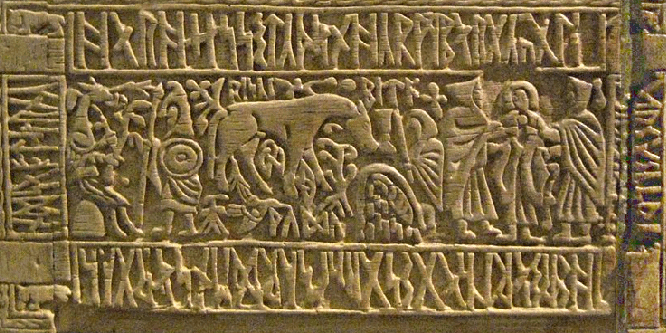

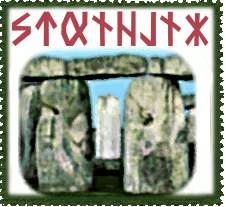
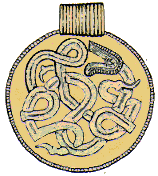 Now
this is an artful old Danish bracteate. It's a special kind of hollow
medal that can also be used as a coin. This bracteate is fantastic
artwork from the Denmark of the era of the Vikings; it was found in
Snorup near Copenhagen. What we see on it is the likeness of a
dragon, or rather of a worm. Several such medals were found. They
give us the impression that in that era, the worm or dragon was
definitely known to many Danes and Saxons, not only as a symbol of
luck but as Hel, the goddess of the dead. This motive is comparable
to the mythical snake Ouroboros. That snake is often shown encircling
the world, clutching it's own tail with it's head. The head here
however ends up in two big jaws. These symbolize, from the lucid
point of view of the UTR, the two front blood cranes that supply the
Goddess of Earth. In Nordic sagas this snake is called Midgardormr,
Worm of the Earth. People from the sea coasts believed that it lived
deep in the outer ocean, and hoped it would protect them from
inundations.
Now
this is an artful old Danish bracteate. It's a special kind of hollow
medal that can also be used as a coin. This bracteate is fantastic
artwork from the Denmark of the era of the Vikings; it was found in
Snorup near Copenhagen. What we see on it is the likeness of a
dragon, or rather of a worm. Several such medals were found. They
give us the impression that in that era, the worm or dragon was
definitely known to many Danes and Saxons, not only as a symbol of
luck but as Hel, the goddess of the dead. This motive is comparable
to the mythical snake Ouroboros. That snake is often shown encircling
the world, clutching it's own tail with it's head. The head here
however ends up in two big jaws. These symbolize, from the lucid
point of view of the UTR, the two front blood cranes that supply the
Goddess of Earth. In Nordic sagas this snake is called Midgardormr,
Worm of the Earth. People from the sea coasts believed that it lived
deep in the outer ocean, and hoped it would protect them from
inundations.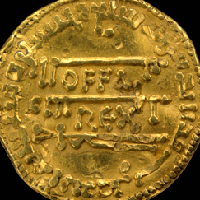 This
is one of the most precious coins that ever were made in Britain.
It's from Offa, king of the Anglo-Saxon kingdom of Mercia. The
strange thing is that this looks like an Arab gold coin! The text
says "King Offa" in Latin, but all around it and on the
other side there are Arabic inscriptions. Some experts say that this
is a copy of a dinar made by the Arabs, who at that time had
conquered Spain. This unique coin may have been a fake for reasons of
propaganda. But since king Offa had to pay tributes in gold to Rome,
it is not unlikely that he may have used such coins as a menace to
convert to Islam.
This
is one of the most precious coins that ever were made in Britain.
It's from Offa, king of the Anglo-Saxon kingdom of Mercia. The
strange thing is that this looks like an Arab gold coin! The text
says "King Offa" in Latin, but all around it and on the
other side there are Arabic inscriptions. Some experts say that this
is a copy of a dinar made by the Arabs, who at that time had
conquered Spain. This unique coin may have been a fake for reasons of
propaganda. But since king Offa had to pay tributes in gold to Rome,
it is not unlikely that he may have used such coins as a menace to
convert to Islam.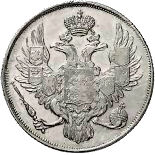 Hey,
if you just decided to become a coin collector now, here's another
coin that might interest you. This is an old Russian three rubles
coin. It's so special because these were the first coins made of
platinum! So from the point of view of diversity, they are uniquely
special. In the Internet they sell these coins right now for a little
more than 2000 £. If you favour the idea of diversity, then you
may expect these coins to rise in value in the future. But wait a
minute! There is a problem with those coins, and it is typical for
the issue of diversity. These are rare and look nicely alien, but
they also are of poorer quality, compared to our types. Platinum is a
rather soft metal. That's why on this coin the knight Saint George in
the middle has lost his face.
Hey,
if you just decided to become a coin collector now, here's another
coin that might interest you. This is an old Russian three rubles
coin. It's so special because these were the first coins made of
platinum! So from the point of view of diversity, they are uniquely
special. In the Internet they sell these coins right now for a little
more than 2000 £. If you favour the idea of diversity, then you
may expect these coins to rise in value in the future. But wait a
minute! There is a problem with those coins, and it is typical for
the issue of diversity. These are rare and look nicely alien, but
they also are of poorer quality, compared to our types. Platinum is a
rather soft metal. That's why on this coin the knight Saint George in
the middle has lost his face. This
sticker was placed here in Cologne by some local hooligans. They sell
beer under the likeness of this dog. Some also eventually put up most
insulting and vicious cop-hater and -killer stickers! As we study the
progress of these rakes, we find that some used to be present at a
Reggae festival. With that Negro culture also cannabis (dope, ganja)
became popular. Typical for the Greys is to try and make you consume
psychiatric or other drugs and alcohol. It's easier then for them to
consume you! In the event that you are in trouble better take a
shower.
This
sticker was placed here in Cologne by some local hooligans. They sell
beer under the likeness of this dog. Some also eventually put up most
insulting and vicious cop-hater and -killer stickers! As we study the
progress of these rakes, we find that some used to be present at a
Reggae festival. With that Negro culture also cannabis (dope, ganja)
became popular. Typical for the Greys is to try and make you consume
psychiatric or other drugs and alcohol. It's easier then for them to
consume you! In the event that you are in trouble better take a
shower.